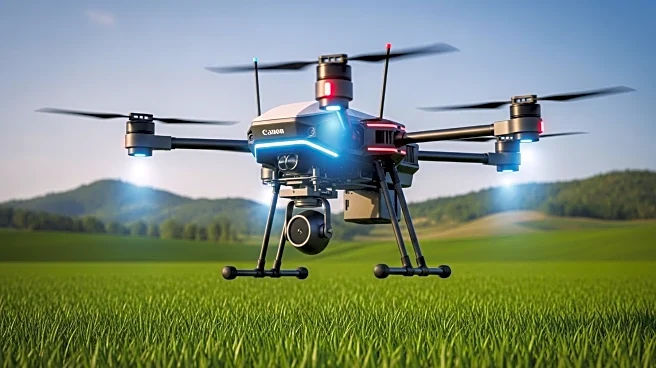What's Happening?
The agriculture industry is under pressure to increase yields while managing resources amid climate change and rising global food demand. Advanced technologies are transforming how farmers manage their fields, providing real-time insights and actionable recommendations. Farmers must balance variables such as irrigation, fertilization, and pest control to optimize crop yields. The gap between agricultural potential and actual output often depends on the information available to growers. Without timely, accurate data, farmers struggle to make optimal decisions. The digital revolution offers new technologies and data-driven insights, but technology alone cannot solve the challenges faced by farmers. A balance between technology and human expertise is necessary to achieve ideal yields and outcomes.
Why It's Important?
The integration of digital tools in agriculture is crucial for addressing the challenges posed by climate change and increasing food demand. By leveraging data-driven insights, farmers can optimize resource use, reduce waste, and improve crop yields. This approach not only enhances productivity but also supports sustainable farming practices, which are increasingly demanded by governments and consumers. The adoption of digital technologies in agriculture can lead to more efficient and environmentally friendly farming, benefiting both farmers and the broader society. As the agriculture industry embraces these innovations, it will be better positioned to meet global food needs and navigate the complexities of modern farming.
What's Next?
The future of agriculture will likely see further integration of digital tools, such as soil and weather sensors, remote sensing, and artificial intelligence, to enhance crop monitoring and decision-making. Farmers will need to adopt scalable solutions that integrate seamlessly with existing systems, prioritizing ease of use and automation. As digital technologies become more prevalent, the agriculture industry will continue to evolve, shaping a future that is more accessible, affordable, and practical for growers of all sizes. The ongoing development of these technologies will play a key role in ensuring food security and sustainability in the face of climate change and global demand.
Beyond the Headlines
The shift towards digital agriculture raises important considerations regarding the balance between technology and traditional farming practices. While digital tools offer significant benefits, human expertise remains essential to contextualize AI-driven insights. The integration of technology in agriculture also presents ethical and privacy challenges, particularly in terms of data security and user consent. As the industry continues to evolve, ensuring that farmers have control over their data and can make informed decisions will be crucial. The long-term impact of digital agriculture on farming communities and rural economies will also be an area of interest, as these technologies reshape the agricultural landscape.









